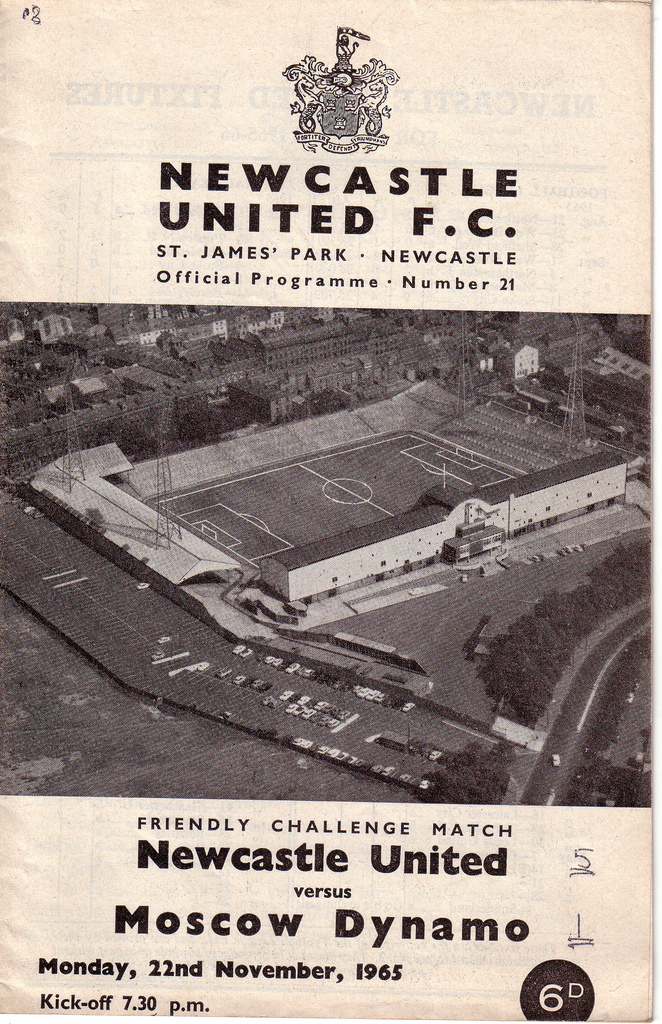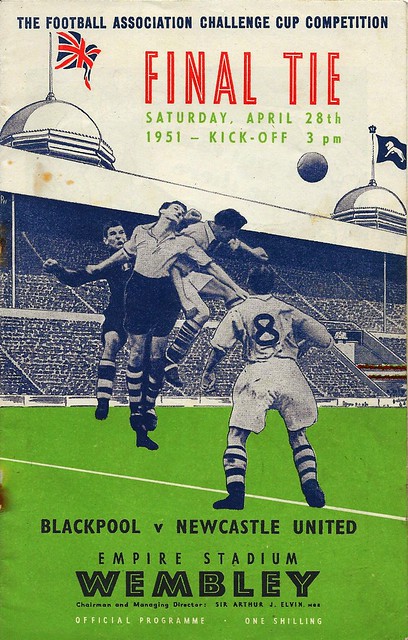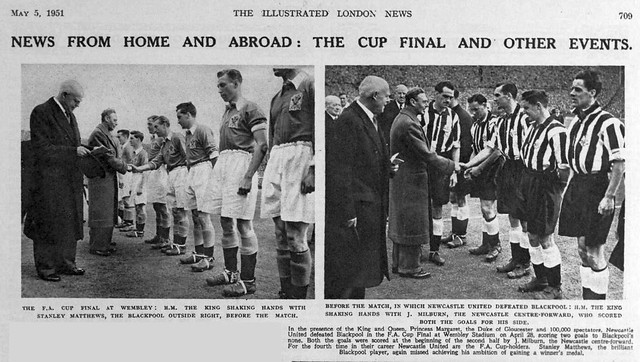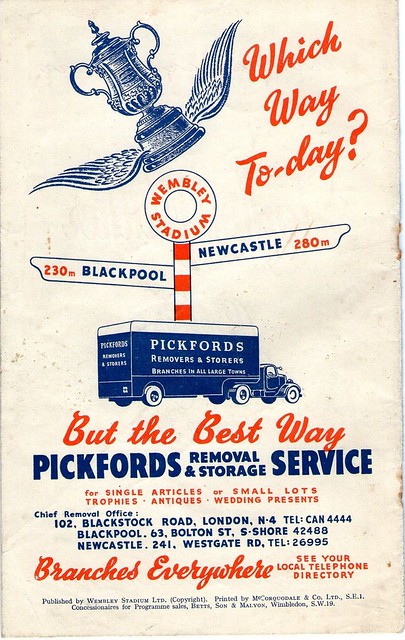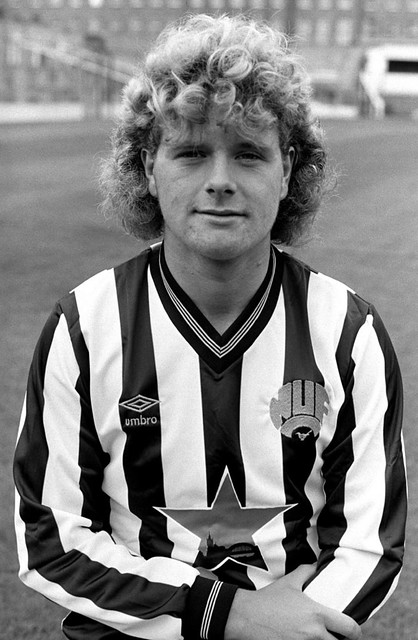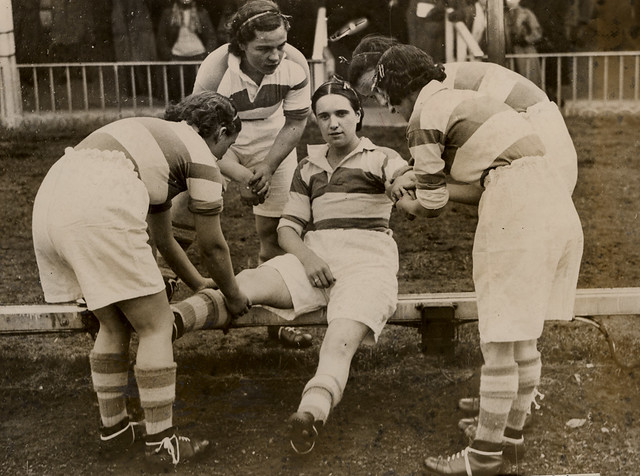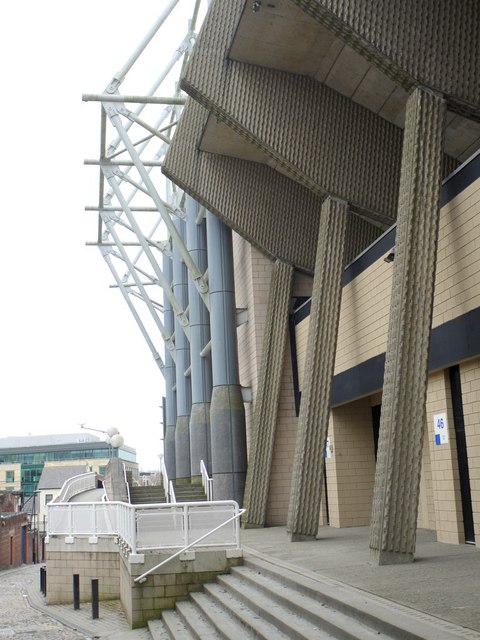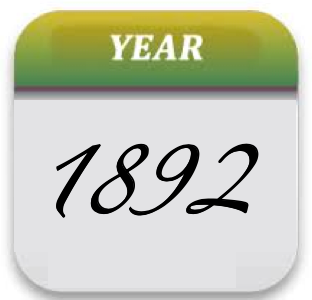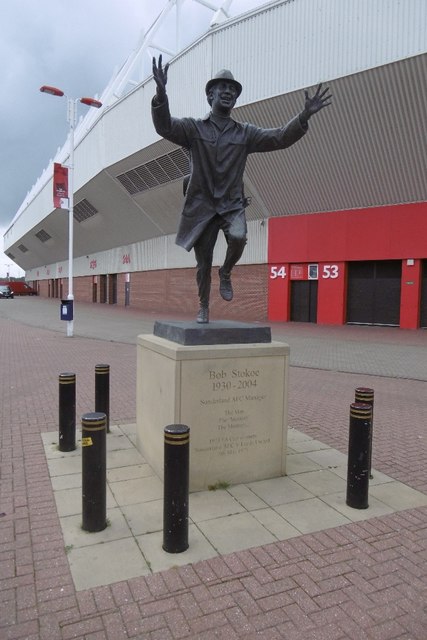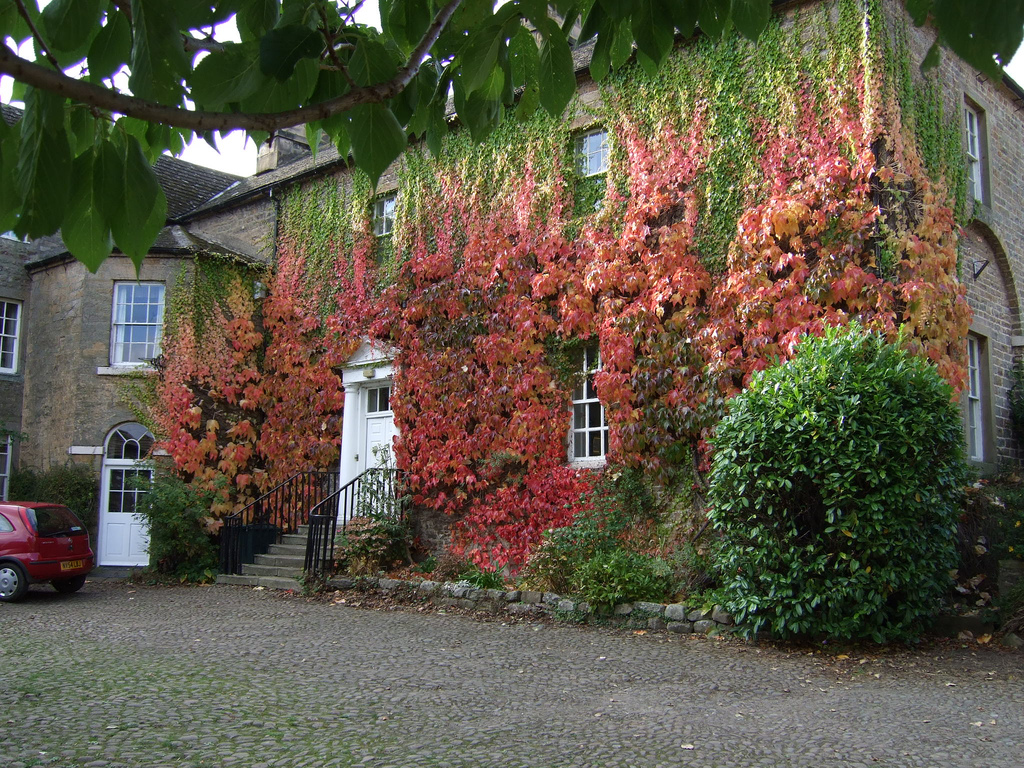Topics > Sport > Football > Newcastle United FC
Newcastle United FC
- 9th December 1892: Newcastle East End became known as Newcastle United FC.
- FA Cup winners in 1910, 1924, 1932, 1951, 1952, and 1955.
- 19th September 1999: Bobby Robson's 1st match as manager of Newcastle United; 8-0 win over Sheffield Wednesday.
- 16th March 2025: Newcastle United beat Liverpool 2-1 in the Carabao Cup final, to win their first domestic trophy since 1955.
Early history
The first record of football being played on Tyneside dates from 3 March 1877 at Elswick Rugby Club. Later that year, Newcastle's first football club, Tyne Association, was formed. The origins of Newcastle United Football Club itself can be traced back to the formation of a football club by the Stanley Cricket Club of Byker in November 1881. This team was renamed Newcastle East End F.C. in October 1882, to avoid confusion with the cricket club in Stanley, County Durham. Rosewood F.C. of Byker merged with Newcastle East End a short time later. In 1886, Newcastle East End moved from Byker to Heaton. In August 1882, Newcastle West End F.C. formed from West End Cricket Club, and in May 1886, the club moved into St James' Park. The two clubs became rivals in the Northern League. In 1889, Newcastle East End became a professional team, before becoming a limited company the following March. However, on the other hand, Newcastle West End were in serious financial trouble and approached East End with a view to a take over. Newcastle West End were eventually dissolved, and a number of their players and backroom staff joined Newcastle East End, effectively merging the two clubs, with Newcastle East End taking over the lease on St James' Park in May 1892.
With only one senior club in the city for fans to support, development of the club was much more rapid. Despite being refused entry to the Football League's First Division at the start of the 1892–93 season, they were invited to play in their new Second Division. However, with no big names playing in the Second Division, they turned down the offer and remained in the Northern League, stating "gates would not meet the heavy expenses incurred for travelling". In a bid to start drawing larger crowds, Newcastle East End decided to adopt a new name in recognition of the merger. Suggested names included Newcastle F.C., Newcastle Rangers, Newcastle City and City of Newcastle, but Newcastle United was decided upon on 9 December 1892, to signify the unification of the two teams. The name change was accepted by the Football Association on 22 December, but the club was not legally constituted as Newcastle United Football Club Co. Ltd. until 6 September 1895. At the start of the 1893–94 season, Newcastle United were once again refused entry to the First Division and so joined the Second Division, along with Liverpool and Woolwich Arsenal. They played their first competitive match in the division that September against Woolwich Arsenal, with a score of 2–2.
Turnstile numbers were still low, and the incensed club published a statement stating, "The Newcastle public do not deserve to be catered for as far as professional football is concerned". However, eventually figures picked up by 1895–96, when 14,000 fans watched the team play Bury. That season Frank Watt became secretary of the club, and he was instrumental in promotion to the First Division for the 1898–99 season. However, they lost their first game 4–2 at home to Wolves and finished their first season in thirteenth place.
In 1903–04, the club built up a promising squad of players, and went on to dominate English football for almost a decade, the team known for their "artistic play, combining team-work and quick, short passing". Long after his retirement, Peter McWilliam, the team's defender at the time, said "The Newcastle team of the 1900s would give any modern side a two goal start and beat them, and further more, beat them at a trot." Newcastle United went on to win the League on three occasions during the 1900s; 1904–05, 1906–07 and 1908–09. In 1904–05, they nearly did the double, losing to Aston Villa in the 1905 FA Cup Final. They were beaten again the following year by Everton in the 1906 FA Cup Final. They reached the final again in 1908 where they lost to Wolves. In 1908 the team suffered a record 9–1 home defeat to local rivals Sunderland in the league but still won that season's league title. They finally won the FA Cup in 1910 when they beat Barnsley in the final. They lost again the following year in the final against Bradford City.
The team returned to the FA Cup final in 1924, in the second final held at the then new Wembley Stadium. They defeated Aston Villa, winning the club's second FA Cup. Three years later they won the First Division championship a fourth time in 1926–27, with Hughie Gallacher, one of the most prolific goal scorers in the club's history, captaining the team. Other key players in this period were Neil Harris, Stan Seymour and Frank Hudspeth. In 1930, Newcastle United came close to relegation, and at the end of the season Gallacher left the club for Chelsea, and at the same time Andy Cunningham became the club's first team manager. In 1931–32, the club won the FA Cup a third time. However, a couple of years later, at the end of the 1933–34 season, the team were relegated to the Second Division after 35 seasons in the top. Cunningham left as manager and Tom Mather took over.
The club found it difficult to adjust to the Second Division and were nearly further relegated in the 1937–38 season, when they were spared on goal averages. However, when World War II broke in 1939, Newcastle had a chance to regroup, and in the War period, they brought in Jackie Milburn, Tommy Walker and Bobby Cowell. They were finally promoted back to the First Division at the end of the 1947–48 season. During the 1950s, Newcastle won the FA Cup trophy on three occasions within a five-year period, beating Blackpool in 1951, Arsenal in 1952, and Manchester City in 1955. However, after this last FA Cup victory the club fell back into decline and were relegated to the Second Division once again at the end of the 1960–61 season under the management of Charlie Mitten. Mitten left after one season in the Second Division and was replaced by former player Joe Harvey. Newcastle returned to the First Division at the end of the 1964–65 season after winning the Second Division title. Under Harvey, the club qualified for European competition for the first time after a good run in the 1967–68 season and the following year won the 1969 Inter-Cities Fairs Cup Final, triumphing 6–2 over two legs against Hungary's Újpest in the final.
The 70s and 80s
Harvey bought striker Malcolm Macdonald in the summer of 1971, for a club record transfer fee of £180,000. He was an impressive goal scorer, who led United's attack to Wembley in their 1974 FA Cup Final defeat at the hands of Liverpool. The club also had back to back triumphs in the Texaco Cup in 1974 and 1975. Harvey left the club in 1975, with Gordon Lee brought in to replace him. Lee took the team to the 1976 Football League Cup Final against Manchester City, but failed to bring the trophy back to Tyneside. However, he sold Macdonald to Arsenal at the end of the season, a decision of which Macdonald later said "I loved Newcastle, until Gordon Lee took over". Lee left for Everton in 1977, and was replaced by Richard Dinnis.
United dropped once again to the Second Division at the end of the 1977–78 season. Dinnis was replaced by Bill McGarry, and then he was replaced by Arthur Cox. Cox steered Newcastle back to the First Division at the end of the 1983–84 season, with players such as Peter Beardsley, Chris Waddle, and ex-England captain Kevin Keegan the fulcrum of the team. However, with a lack of funds, Cox left for Derby County and Keegan retired. With managers such as Jack Charlton and then Willie McFaul, Newcastle remained in the top-flight, until key players such as Waddle, Beardsley and Paul Gascoigne were sold, and the team was relegated once more in 1989. McFaul left the managerial post, and was replaced by Jim Smith. Smith left at the start of the 1991–92 season and the board appointed Osvaldo Ardiles his replacement.
The 90s
Sir John Hall became the club's chairman in 1992, and replaced Ardiles with Keegan, who managed to save the team from relegation to the Third Division. Keegan was given more money for players, and he brought in Rob Lee, Paul Bracewell and Barry Venison and the club won the then First Division Championship at the end of the 1992–93 season, earning promotion to the then new Premier League. At the end of the 1993–94 season, their first year back in the top flight they finished in third, their highest league finish since 1927. The attacking philosophy of Keegan led to the team being labelled "The Entertainers" by Sky Sports.
Keegan took Newcastle to two consecutive runners-up finishes in the league in 1995–96 and 1996–97, coming very close to winning the title in the former season. This success was in part due to the talent of players like David Ginola, Les Ferdinand and Alan Shearer, who was signed on 30 July 1996 for a then world record fee of £15 million.
Keegan left Newcastle in January 1997 and was replaced by Kenny Dalglish, however the club endured a largely unsuccessful season with a 13th-place finish in the 1997–98 FA Premier League, failure to progress beyond the group stages of the 1997–98 UEFA Champions League despite beating Barcelona and group winners Dynamo Kiev at St James Park as well as coming from 2–0 down to draw 2–2 with Valery Lobanovsky's team in Ukraine and defeat in the 1998 FA Cup Final. Dalglish was replaced as manager early in the following season by Ruud Gullit.
The club once again finished thirteenth in the league and lost the 1999 FA Cup Final. Gullit fell into disagreements with the squad and chairman Freddy Shepherd, and quit the club four games into the 1999–2000 season with the team bottom of the table to be replaced by Bobby Robson. The club managed to reach an FA Cup Semi-final and to stay in the Premier League.
2000s
A title challenge emerged during the 2001–02 season, and Newcastle's fourth-place finish saw them qualify for the Champions League. The following season, Robson guided the team to another title challenge and finished third in the League, and the second group stage of the Champions League. Newcastle finished fifth in the league at the end of the 2003–04 season, and exited the Champions League in the qualifying rounds, but despite this Robson was sacked in August 2004 following a series of disagreements with the club.
Graeme Souness was brought in to manage by the start of the 2004–05 season. In the time he managed, he broke the club's transfer record by signing Michael Owen, however he was sacked in February 2006 after a bad start to the 2005–06 season. Glenn Roeder took over, initially on a temporary basis, before being appointed full-time manager at the end of the season. Shearer retired at the end of the 2005–06 season as the club's all-time record goal scorer, with a total of 206 goals.
Decline and relegation
Despite finishing the 2005–06 season in seventh, Roeder's fortunes changed in the 2006–07 season, with a terrible injury run to the senior squad, and he left the club by mutual consent on 6 May 2007.
Sam Allardyce was appointed Roeder's replacement as manager on 15 May 2007. On 7 June, Freddy Shepherd's final shares in the club were sold to Mike Ashley and Shepherd was replaced as chairman by Chris Mort on 25 July.
Allardyce departed the club on in January 2008 by mutual consent after a bad start to the 2007–08 season, and Kevin Keegan was reappointed as Newcastle manager. Mort stepped down as chairman in June and was replaced by Derek Llambias, a long-term associate of Ashley. Newcastle finished the 2007–08 season in twelfth place, but as the season drew to a close, Keegan publicly criticised the board, claiming they were not providing the team enough financial support.
In September 2008 Keegan resigned as manager, stating "It's my opinion that a manager must have the right to manage and that clubs should not impose upon any manager any player that he does not want". Former Wimbledon manager Joe Kinnear was appointed as his replacement, but in February 2009, due to his heart surgery, Alan Shearer was appointed interim manager in his absence. Under Shearer, the club were relegated to the Football League Championship at the end of the 2008–09 season, the first time the club had left the Premier League since joining it in 1993.
Following their relegation, the club was put up for sale in June 2008, with an asking price of £100 million. Chris Hughton was given the manager job on a caretaker basis before taking over full-time on 27 October 2009. On the same day, Ashley announced that the club was no longer for sale.
2010s
Hughton led Newcastle to win the 2009–10 Football League Championship, securing automatic promotion on 5 April 2010 with five games remaining, and securing the title on 19 April; Newcastle were promoted back to the Premier League after just one season away.
Under Hughton, Newcastle enjoyed a strong start to the 2010–11 season, but he was sacked on 6 December 2010. The club's board stated that they felt "an individual with more managerial experience [was] needed to take the club forward." Three days later, Alan Pardew was appointed as manager with a five-and-a-half-year contract. Further controversy was caused on 31 January 2011, when striker Andy Carroll was sold to Liverpool for a club record of £35 million. Despite this turbulence, Newcastle were able to finish 12th at the end of the season, with one particular highlight being a 4–4 home draw against Arsenal that saw Newcastle come back from four goals down to claim a point.
The start of the 2011–12 season saw an overhaul in the first team, with the sale of influential first team players Kevin Nolan, Joey Barton and José Enrique during the summer and the elevation of Tim Krul as first choice goalkeeper and centre back Fabricio Coloccini as captain. Signings such as Yohan Cabaye, Italian international Davide Santon and Senegalese striker Demba Ba in cut-price deals saw Newcatle adopt a new transfer policy, one which would be met with success in the season. They went on to enjoy one of their strongest openings to a season, playing 11 consecutive games unbeaten. before losing away to Manchester City. Another Senegalese striker, Papiss Cissé, joined in the January transfer window, and Newcastle had a strong second half of the season, eventually securing a place in the 2012–13 Europa League. Newcastle finished in fifth place, their highest league position since the Bobby Robson days. Further honours were to come as Pardew won both the Premier League Manager of the Season and the LMA Manager of the Year awards, captain Coloccini was named in the PFA Team of the Year, and Cissé won the Goal of the Season award for a goal against Chelsea.
The 2012–13 season saw Newcastle regain European football for the first time since 2007. Newcastle made few acquisitions in the summer and suffered injuries over the season, including layoffs to key midfielders Yohan Cabaye and Hatem Ben Arfa, and defenders Steven and Ryan Taylor. As a result, the first half of the season was marred by a run of ten losses in 13 games, which saw the club sink near the relegation zone. In January, Newcastle signed five French players, and advanced to the Europa League quarter-finals before bowing out to eventual finalists Benfica. Domestically, Newcastle struggled, and stayed up after a 2–1 victory over already-relegated Queens Park Rangers on the penultimate game of the season.
The 2014–15 season saw Newcastle fail to win any of their first seven games, prompting fans to start a campaign to get Pardew sacked as manager before a six-game winning run in all competitions (including knocking holders Manchester City out of the Capital One Cup) saw them climb to fifth in the table. After they ended Chelsea's unbeaten start to the season, Pardew left for Crystal Palace. On 26 January 2015, his assistant John Carver was put in charge for the remainder of the season but came close to relegation, staying up on the final day with a 2–0 home win against West Ham, with Jonás Gutiérrez, who beat testicular cancer earlier in the season, scoring the team's second goal.
On 9 June 2015, Carver and his assistant Steve Stone were both sacked and replaced by Steve McClaren the following day. McClaren subsequently signed Georginio Wijnaldum for £14.5 million from PSV Eindhoven along with both Aleksandar Mitrović and Chancel Mbemba from Belgian club Anderlecht for £13 million and £8 million, respectively. Newcastle failed to win any of their first eight Premier League games of the 2015–16 season, a run which included a 0–1 home defeat against Sheffield Wednesday in the third round of the League Cup. In January 2016, the club signed midfielders Jonjo Shelvey and Andros Townsend for a combined total of £24 million as well as midfielder Henri Saivet. However, the club continued to struggle and a 1–3 defeat to Bournemouth on 5 March left Newcastle with its lowest points total after 28 games in its Premier League history. On 11 March McClaren was sacked after nine months as manager, with Newcastle in 19th place in the Premier League and the club winning six of 28 Premier League games during his time at the club. He was replaced by Spaniard Rafael Benítez on the same day, who signed a three-year deal, but was not able to prevent the club from being relegated.
Visit the page: Newcastle United F.C. for references and further details. You can contribute to this article on Wikipedia.
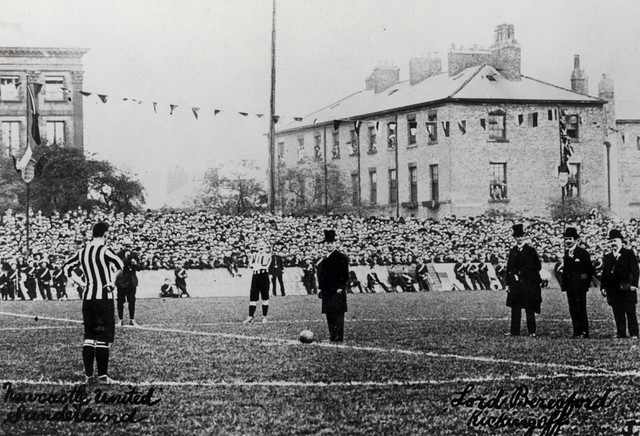
from Newcastle libraries (flickr)
044573:Newcastle v Sunderland derby match St. James Park Newcastle upon Tyne Evening Chronicle 1904
Pinned by Co-Curate Team

from Newcastle University (youtube)
Back With The Cup Aka Newcastle United (1952)
Pinned by Co-Curate Team
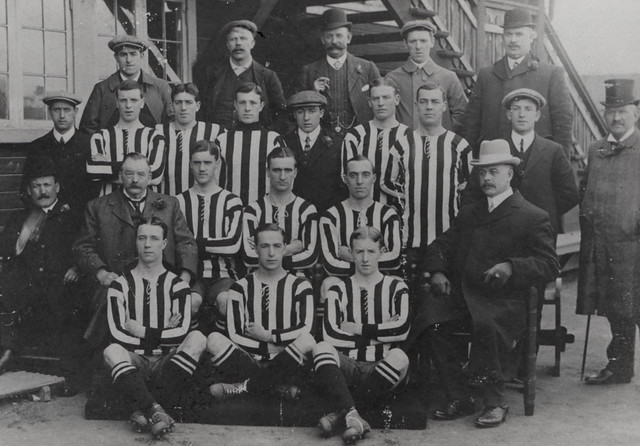
from Newcastle libraries (flickr)
044571:Newcastle United Football Club St. James Park Newcastle upon Tyne Unknown c.1910
Pinned by Co-Curate Team

from Newcastle University (youtube)
Footballers In Training - Newcastle United (1920-1929)
Pinned by Co-Curate Team

from Newcastle University (youtube)
Famous Football Clubs No. 1 - Newcastle United (1934)
Pinned by Co-Curate Team

from Newcastle libraries (flickr)
038789:Newcastle v Burnley match St. James Park Newcastle upon Tyne Unknown 1938
Pinned by Co-Curate Team

from Newcastle University (youtube)
F.A. Cup 5th Round Aka Fa Cup Fifth Round (1936)
Pinned by Simon Cotterill

from Newcastle University (youtube)
Selected Originals - Newcastle Crowds Cheer Cup Heroes Aka Newcastle Home With Cup (1955)
Pinned by Simon Cotterill

from http://memoryboxstories.com/s…
Football Innocence
- Digital story from www.memoryboxstories.com
Teresa muses on her innocence as a young girl, reflecting on a visit to her friend’s house where through the corridor she unknowingly perceived members of …
Added by
Katherine Lloyd
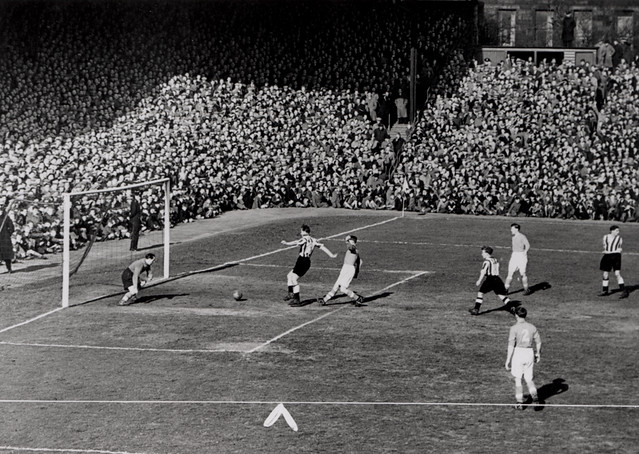
from Newcastle libraries (flickr)
056357:Newcastle United Football Club St. James Park Newcastle upon Tyne Unknown c.1950
Pinned by Katherine Lloyd
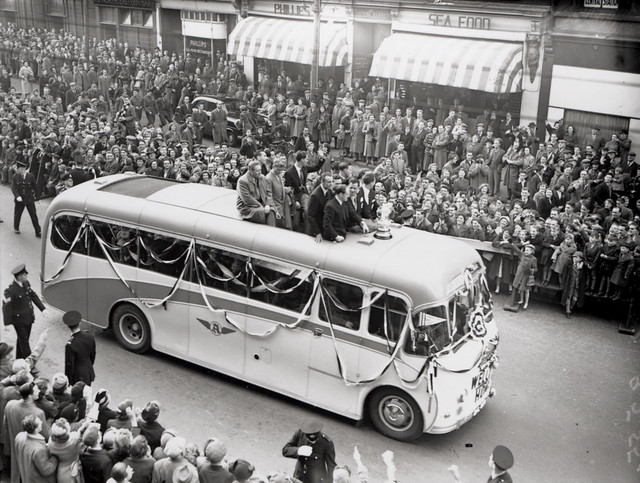
from Newcastle libraries (flickr)
056768:Newcastle United Football Club Newcastle upon Tyne Unknown 1952
Pinned by Katherine Lloyd
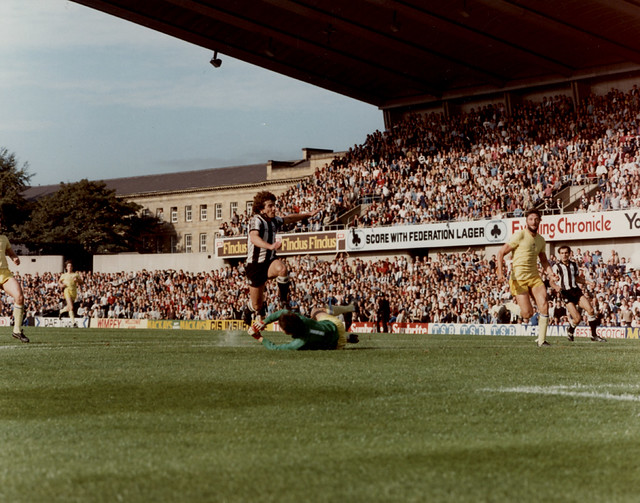
from Newcastle libraries (flickr)
050510:Newcastle United F.C. St. James Park Newcastle upon Tyne 1982
Pinned by Simon Cotterill

Co-Curate Page
Bobby Robson (1933-2009)
- Overview About Bobby Robson Sir Bobby Robson was a famous footballer and manager. Robert William Robson was born on the 18th February 1933 in Sacriston, County Durham. He played football …
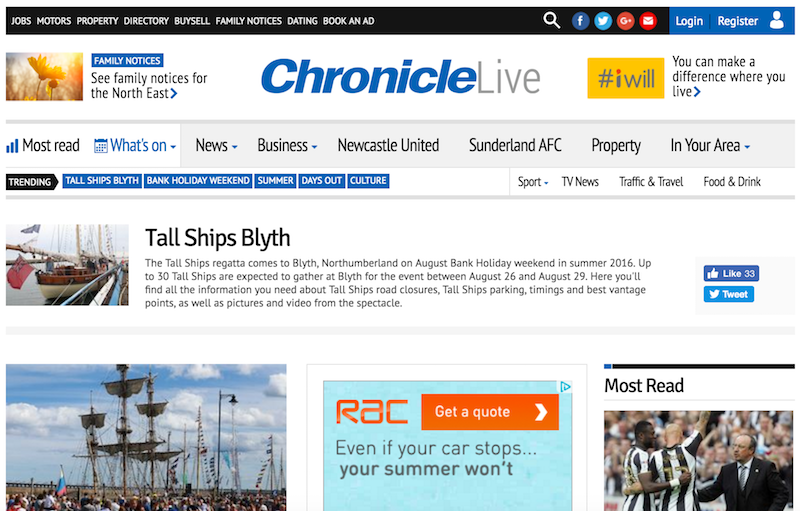
from http://www.chroniclelive.co.u…
Magpies' Greatest Matches: Newcastle United 8 Sheffield Wednesday 0
- "Bobby Robson's homecoming was a never to be forgotten day on Tyneside as Newcastle United romped to a stunning win..."
Added by
Simon Cotterill
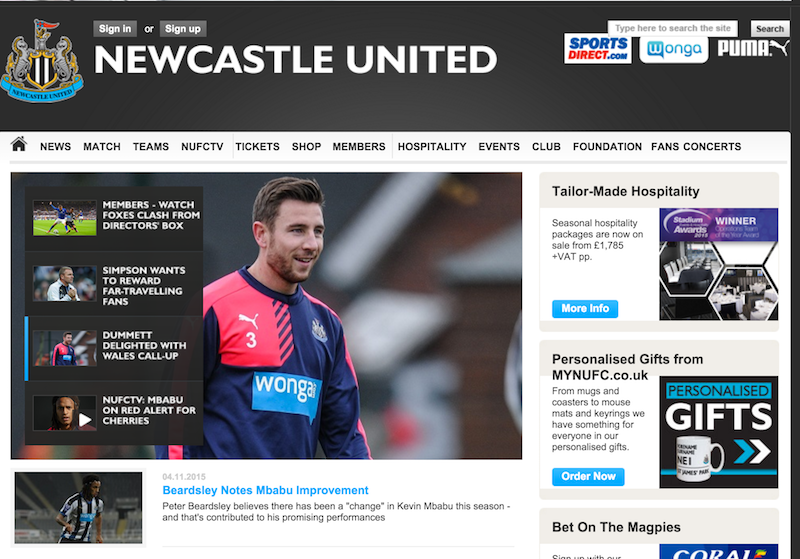
from http://www.nufc.co.uk/
Newcastle United FC
- Official Website of NUFC.
Added by
Simon Cotterill
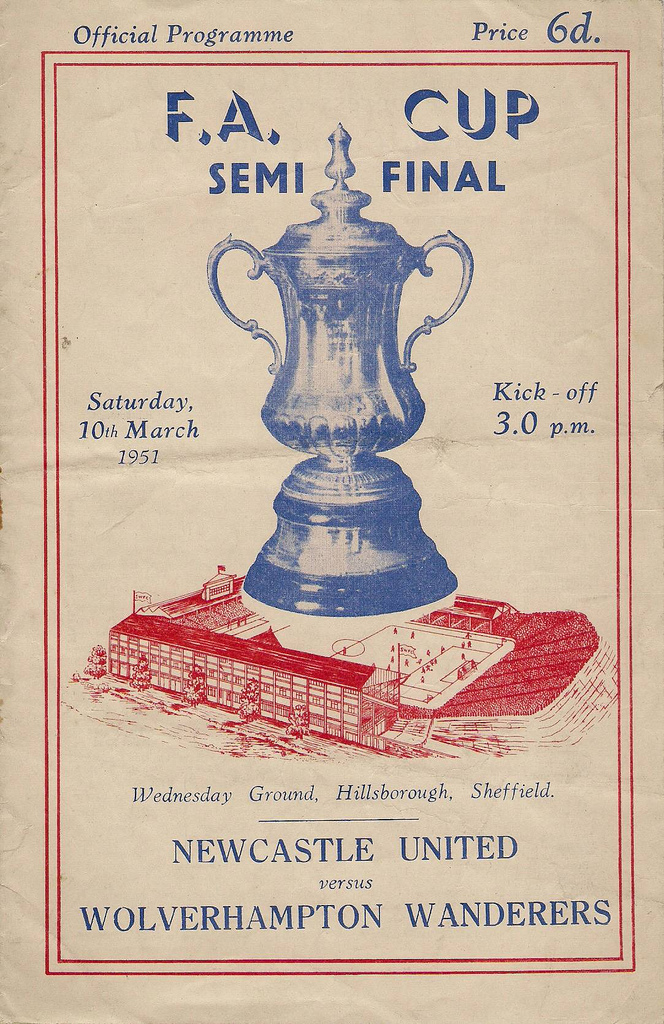
from Flickr (flickr)
Newcastle United v Wolverhampton Wanderers - FA Cup Semi-Final 1951
Pinned by Peter Smith

from Youtube (youtube)
FOOTBALL: 1932 FA Cup: Newcastle United victory parade (1932)
Pinned by Simon Cotterill

from Youtube (youtube)
FOOTBALL: FA Cup: Cup winners Newcastle return home (1952)
Pinned by Simon Cotterill

from Youtube (youtube)
UK: FOOTBALL/SOCCER: NEWCASTLE PARADE F.A. CUP AFTER 3-1 WIN OVER MANCHESTER CITY (1955)
Pinned by Simon Cotterill

from Youtube (youtube)
Sheffield v Newcastle at The Football Association Challenge Cup (1946)
Pinned by Simon Cotterill

from Youtube (youtube)
FOOTBALL: 1932 FA Cup Final: Arsenal v Newcastle (1932)
Pinned by Simon Cotterill

from Youtube (youtube)
UK: FOOTBALL/SOCCER: NEWCASTLE REACH FA CUP FINAL AFTER BEATING YORK 2-0 (1955)
Pinned by Simon Cotterill

from Youtube (youtube)
FOOTBALL/SOCCER -CUP HEROES HOME Newcastle - Wembley winners return. Lord Mayor and 50,000...(1932)
Pinned by Simon Cotterill

from Youtube (youtube)
NEWCASTLE REACH FA CUP FINAL AFTER BEATING YORK 2-0 (1955)
Pinned by Simon Cotterill


from Newcastle libraries (flickr)
044573:Newcastle v Sunderland derby match St. James Park Newcastle upon Tyne Evening Chronicle 1904
Pinned by Co-Curate Team

from Newcastle University (youtube)
Back With The Cup Aka Newcastle United (1952)
Pinned by Co-Curate Team

from Newcastle libraries (flickr)
044571:Newcastle United Football Club St. James Park Newcastle upon Tyne Unknown c.1910
Pinned by Co-Curate Team

from Newcastle University (youtube)
Footballers In Training - Newcastle United (1920-1929)
Pinned by Co-Curate Team

from Newcastle University (youtube)
Famous Football Clubs No. 1 - Newcastle United (1934)
Pinned by Co-Curate Team

from Newcastle libraries (flickr)
038789:Newcastle v Burnley match St. James Park Newcastle upon Tyne Unknown 1938
Pinned by Co-Curate Team

from Newcastle University (youtube)
F.A. Cup 5th Round Aka Fa Cup Fifth Round (1936)
Pinned by Simon Cotterill

from Newcastle University (youtube)
Selected Originals - Newcastle Crowds Cheer Cup Heroes Aka Newcastle Home With Cup (1955)
Pinned by Simon Cotterill

from http://memoryboxstories.com/s…
Football Innocence
- Digital story from www.memoryboxstories.com
Teresa muses on her innocence as a young girl, reflecting on a visit to her friend’s house where through the corridor she unknowingly perceived members of …
Added by
Katherine Lloyd

from Newcastle libraries (flickr)
056357:Newcastle United Football Club St. James Park Newcastle upon Tyne Unknown c.1950
Pinned by Katherine Lloyd

from Newcastle libraries (flickr)
056768:Newcastle United Football Club Newcastle upon Tyne Unknown 1952
Pinned by Katherine Lloyd

from Newcastle libraries (flickr)
050510:Newcastle United F.C. St. James Park Newcastle upon Tyne 1982
Pinned by Simon Cotterill

Co-Curate Page
Bobby Robson (1933-2009)
- Overview About Bobby Robson Sir Bobby Robson was a famous footballer and manager. Robert William Robson was born on the 18th February 1933 in Sacriston, County Durham. He played football …

from http://www.chroniclelive.co.u…
Magpies' Greatest Matches: Newcastle United 8 Sheffield Wednesday 0
- "Bobby Robson's homecoming was a never to be forgotten day on Tyneside as Newcastle United romped to a stunning win..."
Added by
Simon Cotterill

from http://www.nufc.co.uk/
Newcastle United FC
- Official Website of NUFC.
Added by
Simon Cotterill

from Flickr (flickr)
Newcastle United v Wolverhampton Wanderers - FA Cup Semi-Final 1951
Pinned by Peter Smith

from Youtube (youtube)
FOOTBALL: 1932 FA Cup: Newcastle United victory parade (1932)
Pinned by Simon Cotterill

from Youtube (youtube)
FOOTBALL: FA Cup: Cup winners Newcastle return home (1952)
Pinned by Simon Cotterill

from Youtube (youtube)
UK: FOOTBALL/SOCCER: NEWCASTLE PARADE F.A. CUP AFTER 3-1 WIN OVER MANCHESTER CITY (1955)
Pinned by Simon Cotterill

from Youtube (youtube)
Sheffield v Newcastle at The Football Association Challenge Cup (1946)
Pinned by Simon Cotterill

from Youtube (youtube)
FOOTBALL: 1932 FA Cup Final: Arsenal v Newcastle (1932)
Pinned by Simon Cotterill

from Youtube (youtube)
UK: FOOTBALL/SOCCER: NEWCASTLE REACH FA CUP FINAL AFTER BEATING YORK 2-0 (1955)
Pinned by Simon Cotterill

from Youtube (youtube)
FOOTBALL/SOCCER -CUP HEROES HOME Newcastle - Wembley winners return. Lord Mayor and 50,000...(1932)
Pinned by Simon Cotterill

from Youtube (youtube)
NEWCASTLE REACH FA CUP FINAL AFTER BEATING YORK 2-0 (1955)
Pinned by Simon Cotterill






